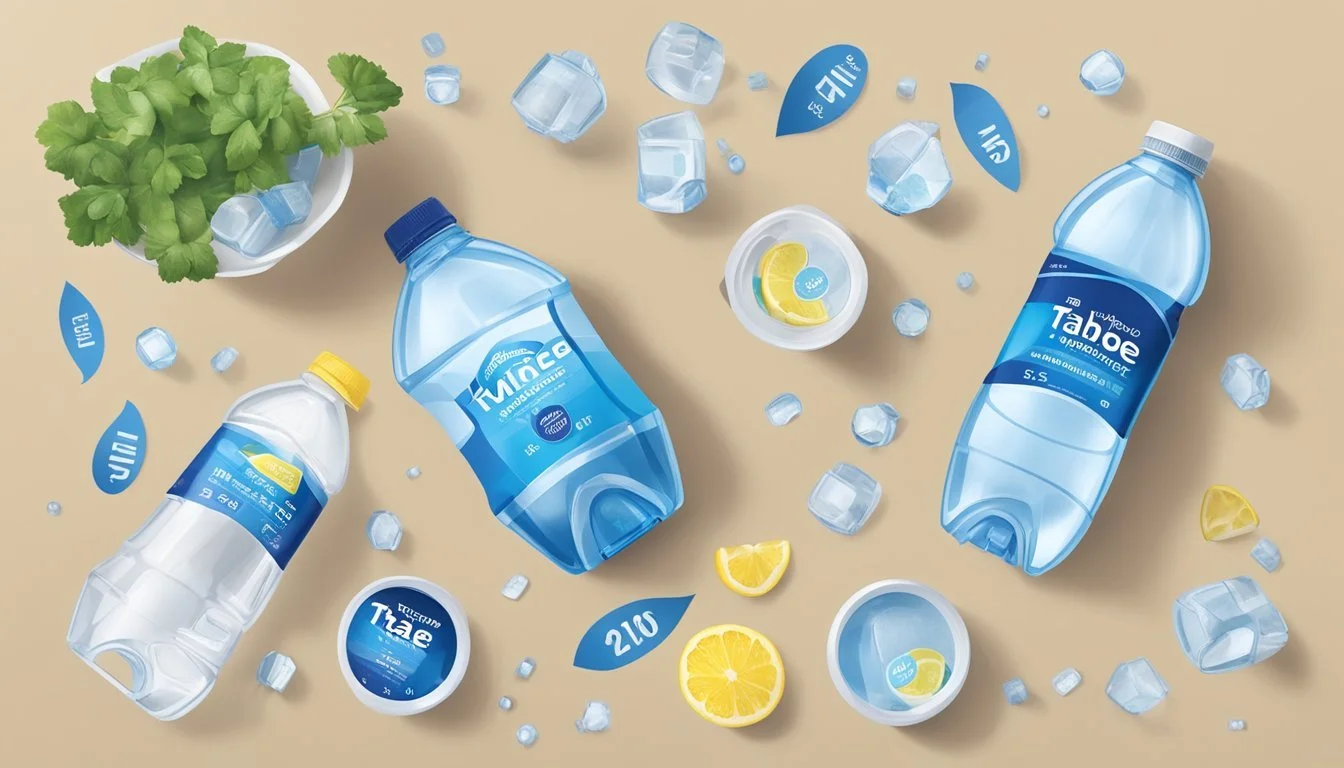Smartwater vs. Tahoe
Comparing Quality and Taste
When choosing between Smartwater and Tahoe, hydration enthusiasts often weigh various factors to determine which bottled water brand aligns with their needs. Smartwater, known for its vapor-distilled process and added electrolytes, offers a crisp taste and the promise of enhanced hydration.
Tahoe Bottled Water, derived from pristine mountain springs, provides natural purity and a rich mineral content. This brand appeals to those who prioritize a more natural source for their hydration needs.
Ultimately, the better choice between Smartwater and Tahoe depends on personal preference and priorities. If consistency in taste and added electrolytes is key, Smartwater stands out. For those seeking a more naturally sourced option with a distinct mineral profile, Tahoe is likely the better option.
Understanding Bottled Water
Different types of bottled waters offer unique benefits based on their source and processing methods. Regulations and safety standards ensure that products are safe for consumption.
Types of Bottled Water
Distilled Water: Pure water obtained by boiling water and condensing the steam back into a liquid. It lacks minerals, making it useful for medical purposes and appliances to avoid mineral build-up.
Spring Water: Collected from natural springs, spring water is rich in minerals. It offers a fresh taste, preferred by many for hydration.
Mineral Water: Containing natural minerals and salts, mineral water is sourced from underground reservoirs. It is often carbonated and is valued for its taste and perceived health benefits.
Alkaline Water: Known for its higher pH level, alkaline water is believed by some to neutralize acid in the body. It is often marketed for its potential health benefits, though scientific evidence is limited.
Tap Water: Municipal water treated to remove contaminants. In some regions, it contains added fluoride for dental health. Tap water is convenient and economical.
Filtered Water: Tap water that has been passed through filters to remove impurities and improve taste. Filters can range from basic pitchers to advanced home systems.
Bottled Water Regulation and Safety
Governments and regulatory bodies oversee bottled water to ensure it is safe to drink. In the United States, the Food and Drug Administration (FDA) enforces safety standards similar to those of municipal tap water.
Labeling: Bottled water labels must accurately reflect the source and any treatments applied. Misleading claims are prohibited.
Testing: Regular testing for contaminants is mandatory. This includes checking for bacteria, chemicals, and other harmful substances.
Inspection: Bottling plants are inspected to ensure compliance with hygiene and safety protocols.
Certifications: Some bottled water brands may carry additional certifications for quality and environmental sustainability, which are often highlighted on their labels.
Overall, bottled water undergoes strict regulation to meet safety standards, making it a reliable hydration option.
Smartwater Analysis
Smartwater's unique production process, variety of alkaline and flavored variants, and the potential health benefits it offers are essential considerations for anyone evaluating bottled water options.
Production Process of Smartwater
Smartwater undergoes a distinct vapor distillation process. This method mimics the hydrologic cycle, where water is evaporated, condensed, and then collected. Coca-Cola Company's glacéau brand ensures the water produced is exceptionally pure.
This rigorous distillation removes virtually all impurities and minerals. After distillation, electrolytes like calcium chloride, magnesium chloride, and potassium bicarbonate are added for taste enhancement, without any artificial additives or unhealthy substances.
Smartwater Alkaline and Flavor Variants
Smartwater extends beyond regular vapor-distilled water with its Smartwater Alkaline and flavored options. Smartwater Alkaline is ionized to have a pH of 9+, aimed at providing balance and purported health benefits.
Flavored variants include unique combinations such as cucumber lime, strawberry blackberry, pineapple kiwi, and passionfruit mango. These options cater to different taste preferences while maintaining the brand’s hallmark purity and added electrolytes for taste.
Health Benefits of Smartwater
The health benefits of Smartwater are centered around its purity and the addition of electrolytes. The vapor-distilled process ensures it is free from contaminants that might be present in tap water.
The added electrolytes can help in maintaining hydration, especially useful after workouts or during illness. Some believe the higher pH in Smartwater Alkaline can contribute to better hydration and balance acidity in the body. The variety of flavors offers an appealing alternative for those who find plain water less palatable, aiding in increased water consumption.
Tahoe Water Evaluation
Tahoe water is known for its pristine source, robust filtration process, distinct mineral profile, and commitment to environmental sustainability. Key aspects include its sourcing methods, taste, mineral content, and eco-friendly initiatives.
Tahoe's Sourcing and Filtration Methods
Tahoe water is sourced from the pristine Tahoe Basin, renowned for its clear and unpolluted waters. This region provides a reliable supply of high-quality water, ensuring consistency in every bottle.
Tahoe employs a multi-step filtration method, including reverse osmosis, ultraviolet light, and sometimes ozone treatment. These procedures effectively remove impurities while preserving essential minerals, resulting in clean and safe drinking water.
Taste Profile and Mineral Content
Taste tests frequently praise Tahoe water for its crisp and clean flavor. This refreshing taste can be attributed to its balanced mineral content and low sodium levels.
Tahoe water contains moderate potassium levels and relatively low sodium, ensuring that it remains hydrating without an overly salty flavor. The specific mineral composition may vary slightly depending on the batch but consistently contributes to the water's appealing taste and high-quality profile.
Tahoe's Environmental Commitment
Tahoe water places a strong emphasis on environmental sustainability. Efforts include the use of recyclable packaging to minimize waste. They also prioritize eco-friendly practices throughout their bottling process to reduce their environmental footprint.
Furthermore, Tahoe is committed to protecting their water source, ensuring that the Tahoe Basin remains a pristine environment. This holistic approach to sustainability underscores their dedication to providing not only high-quality water but also contributing positively to the environmental ecosystem.
Nutritional Comparison
This section examines the nutritional values of Smartwater and Tahoe bottled water. Key points include electrolyte and mineral content, pH levels and their health implications, and calorie and additive content.
Electrolyte and Mineral Comparison
Smartwater and Tahoe contain various electrolytes and minerals that impact hydration and overall health.
Smartwater is known for adding electrolytes like calcium, magnesium, and potassium through a vapor-distillation process. This helps improve taste and supports bodily functions.
Tahoe water naturally contains electrolytes originating from its source. Essential minerals like sodium, potassium, and chloride are present, aiding in electrolyte balance and hydration. Both waters have low levels of heavy metals, ensuring safety.
Table Comparison:
Electrolyte/Mineral Smartwater Tahoe Calcium Yes Yes Magnesium Yes Yes Potassium Yes Yes Sodium Minimal Present Chloride Not listed Present
pH Levels and Health Implications
pH levels influence water taste and potential health benefits or risks.
Smartwater typically has a pH around 7.0, which is neutral and similar to most tap water. It neither significantly contributes to alkalinity nor acidity, making it suitable for general consumption.
Tahoe water, depending on its source, might have a slightly alkaline pH, typically around 7.5 to 8.0. Alkaline water proponents suggest it can help neutralize acidity in the body and improve hydration.
Understanding the pH:
Neutral pH (7.0): Balanced, general hydration.
Slightly Alkaline pH (7.5-8.0): Potentially helps with reducing body acidity.
Calorie and Additive Content Analysis
Calorie content and the presence of additives can influence a water's healthfulness.
Smartwater is calorie-free and contains no sugars or artificial sweeteners. Its primary additives are electrolytes, which enhance taste and hydration without adding calories.
Tahoe water also contains no calories or sugars. Additives are often absent, preserving the natural balance of minerals present in the source. It focuses on delivering pure hydration without any artificial enhancements.
Key Points:
Both waters are calorie-free and sugar-free.
Smartwater includes additional electrolytes.
Tahoe relies on natural mineral content.
In summary, Smartwater offers added electrolytes through distillation, while Tahoe provides natural mineral content from its source, both maintaining healthful profiles with no calories or sugars.
Safety and Health Aspects
When evaluating Smartwater and Tahoe, it's crucial to consider the safety and health implications of both brands. This includes the materials used in their packaging, potential contaminants, and the impact of hydration on the immune system.
Understanding BPA in Plastic Bottles
Bisphenol A (BPA) is a chemical used in the production of certain plastics, including some water bottles. Exposure to BPA can interfere with human hormones, leading to negative health effects. Both Smartwater and Tahoe use BPA-free packaging, which reduces this risk.
Ensuring that water bottles are BPA-free can prevent potential disruptions in hormonal balance. This aspect is particularly relevant for products consumed daily, like bottled water.
Contaminants and Purity
The purity of bottled water is a significant factor in its safety for consumption. Both Smartwater and Tahoe undergo rigorous purification processes:
Smartwater: Utilizes vapor distillation to eliminate impurities, providing a high-purity product.
Tahoe: Implements an advanced filtration method to remove contaminants, ensuring clean water.
Regular testing and adherence to quality standards help maintain the cleanliness and safety of the water in both brands. This meticulous attention to detail is vital for safeguarding health.
Hydration and Its Effect on the Immune System
Proper hydration is essential for maintaining a robust immune system. Both Smartwater and Tahoe offer products that can contribute to better hydration.
Smartwater: Infused with electrolytes, which can aid in maintaining fluid balance and supporting overall health.
Tahoe: Also provides natural hydration benefits that help in keeping the immune system functioning optimally.
Hydration aids the immune system by ensuring that various bodily functions operate efficiently, reducing the risk of infection and illness. Regular intake of purified water can therefore be a vital aspect of maintaining good health.
Consumer Considerations
When deciding between Smartwater and Tahoe, customers often look at price, convenience, and alternative hydration options. Each brand offers distinct advantages, but understanding these factors can help make a more informed choice.
Price Point and Value
Smartwater is often priced at a premium due to its filtration process and added electrolytes. Consumers can expect to pay around $1.50 to $2.00 per bottle, depending on the retailer and location. Tahoe water, relatively newer to the market, can be found at a slightly lower price, generally ranging from $1.00 to $1.50 per bottle.
Both brands offer multipack options that can reduce the cost per bottle. It’s worthwhile to consider promotions and bulk purchasing to maximize value. Consumers might also compare these prices to alternatives like filtered tap water, which offers significant cost savings despite requiring an initial investment in a filtration system.
Convenience and Lifestyle
Smartwater is widely available in many grocery stores, convenience stores, and online platforms, making it a very convenient option. Its sleek packaging is also designed for on-the-go consumption, appealing to busy individuals and fitness enthusiasts. Smartwater is particularly popular among those who prefer a clean, crisp taste with added electrolytes for hydration without additional calories or sugars.
Tahoe water also targets convenience but emphasizes their product's environmental friendliness with recyclable packaging. Like Smartwater, Tahoe is widely available but is found more frequently in specialty health stores and select online platforms. For those concerned about their environmental footprint, the recyclable packaging might be an important factor.
Alternative Hydration Options
Consumers weighing their choices often consider alternatives such as tap water, filtered tap water, and other specialized bottled waters like mineral or alkaline varieties. Filtered tap water is a cost-effective option with minimal environmental impact, but requires access to clean water and an effective filtration system.
Coconut water and enhanced water options, like flavored or vitamin-infused varieties, offer additional benefits such as natural electrolytes and a refreshing taste, though often at a higher price. These alternatives cater to specific dietary needs or taste preferences, providing a broader spectrum of choices for consumers who prioritize health benefits and variety.
Each option comes with its own set of benefits and trade-offs in terms of cost, taste, convenience, and environmental impact, helping consumers find the right match for their lifestyle and hydration needs.
Conclusion
When comparing Smartwater and Tahoe, several factors come into play.
Health and Nutrition: Smartwater contains added electrolytes like calcium chloride and is marketed for hydration. Tahoe water focuses on purity, sourced from natural springs.
For those involved in fitness training, Smartwater's electrolytes might offer slight advantages. Tahoe provides clean, natural hydration without additives.
Bottled Water Selection: Smartwater offers varieties including alkaline options. Tahoe remains focused on simplicity and purity.
Personal preference will be key in choosing the better option.







